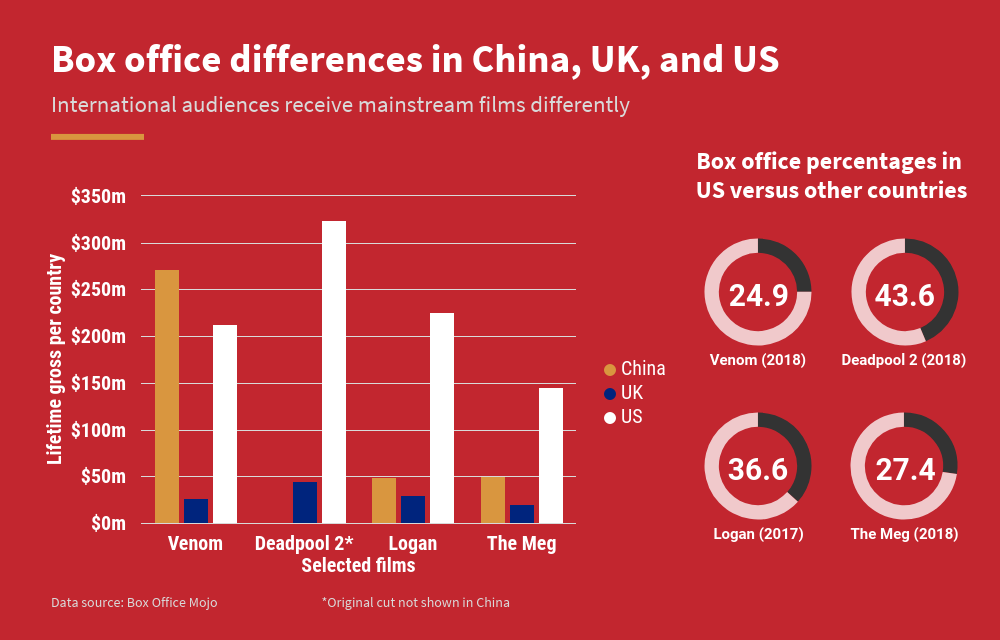By Joanne Yang, Third Year, Social Policy and Politics
On December 21, Once Upon A Deadpool (2018) premiered in Beijing, with fans lining up craving for a long-waited face-to-face meet and greet from Ryan Reynolds, who immediately agreed to go when he received the invitation.
Once Upon a Deadpool, a special PG-13 version of the previously released movie Deadpool 2 (2018), was released shortly before Christmas. Although it contains a lot of new shots, and has also caught attention from X-Men Cinematic Universe fans, it is not a brand new movie and has only been shown on a much smaller scale than the original R-rated Deadpool 2. But, not only did the premiere in Beijing become headlines in many newspapers, the movie itself has gained 151 million dollars in the first week of releasing in China.
.@VancityReynolds, the actor who plays #Deadpool, said on Thursday he was coming to #China to promote his new film Once Upon A Deadpool. He also dissed other superheroes - Wolverine, #SpiderMan, WonderWoman - by saying their trips to China were lame. pic.twitter.com/xcZHnZxd2j
— Global Times (@globaltimesnews) 17 January 2019
Twitter / @globaltimesnews
The reason why Once Upon A Deadpool became such a hit in China is the strict censorship in the Chinese film market. Due to the lack of a proper film rating system, most ‘foreign films’ in China are strictly edited before releasing - scenes considered ‘inappropriate’ for mass audiences will be cut from the film. The R-rated film Logan (2017) was almost given the same treatment and turned into a PG-13 version in order to be permitted to release in China. Both of the Deadpool movies, however, are inappropriate inside and out - its scenes of sex and violence together with its very inappropriate language throughout made it really hard to cut. Not releasing it at all became a rational choice for the Chinese government.
It is therefore not hard to understand why films such as Venom (2018), which was not received very well in Western markets, still gain incredible box office results in the Chinese market. Chinese audiences have always suffered from the starved market as a result of the government censorship and restrictions on releasing foreign films each year. The Marvel Cinematic Universe has also been a great boost to the Chinese film market phenomenon. It has become a trend to watch Marvel and DC related films - regardless of whether you understand it or not. In other words, we will take whatever is offered.

Epigram / Patrick Sullivan
The Chinese market is thus a haven for popcorn movies. Because of the underdevelopment of CGI techniques, there have been very few Chinese films that are able to excite and pump up the adrenaline of the audience. The lack of quality in action and sci-fi movies results in a high demand for big budget foreign films which make use of big explosions and high-tech spaceships. The market has become more like an insurance for popcorn movies. As long as you have big action sequences, we will buy it - the cherry on top being the involvement of some Chinese actors and movie stars. For example, The Meg (2018), although severely criticised among both Western and Chinese audience groups, still received a boost from the Chinese market.
The film industry in China is largely underdeveloped compared to the western countries, despite growing audiences. Due to the political and historical context, films have been highly restricted for decades and few outstanding filmmakers and movies have emerged. The majority of the Chinese audience therefore have a relatively low standard regarding the appreciation of cinema. This is why films such as Venom and The Meg enjoy success at the box office in China ahead of dramas celebrated in the US and UK.
Featured Image Credit: IMDb / Columbia Pictures
Is it right for the Chinese government to take such a hardline approach in censoring cinema?
Facebook // Epigram Film & TV // Twitter









